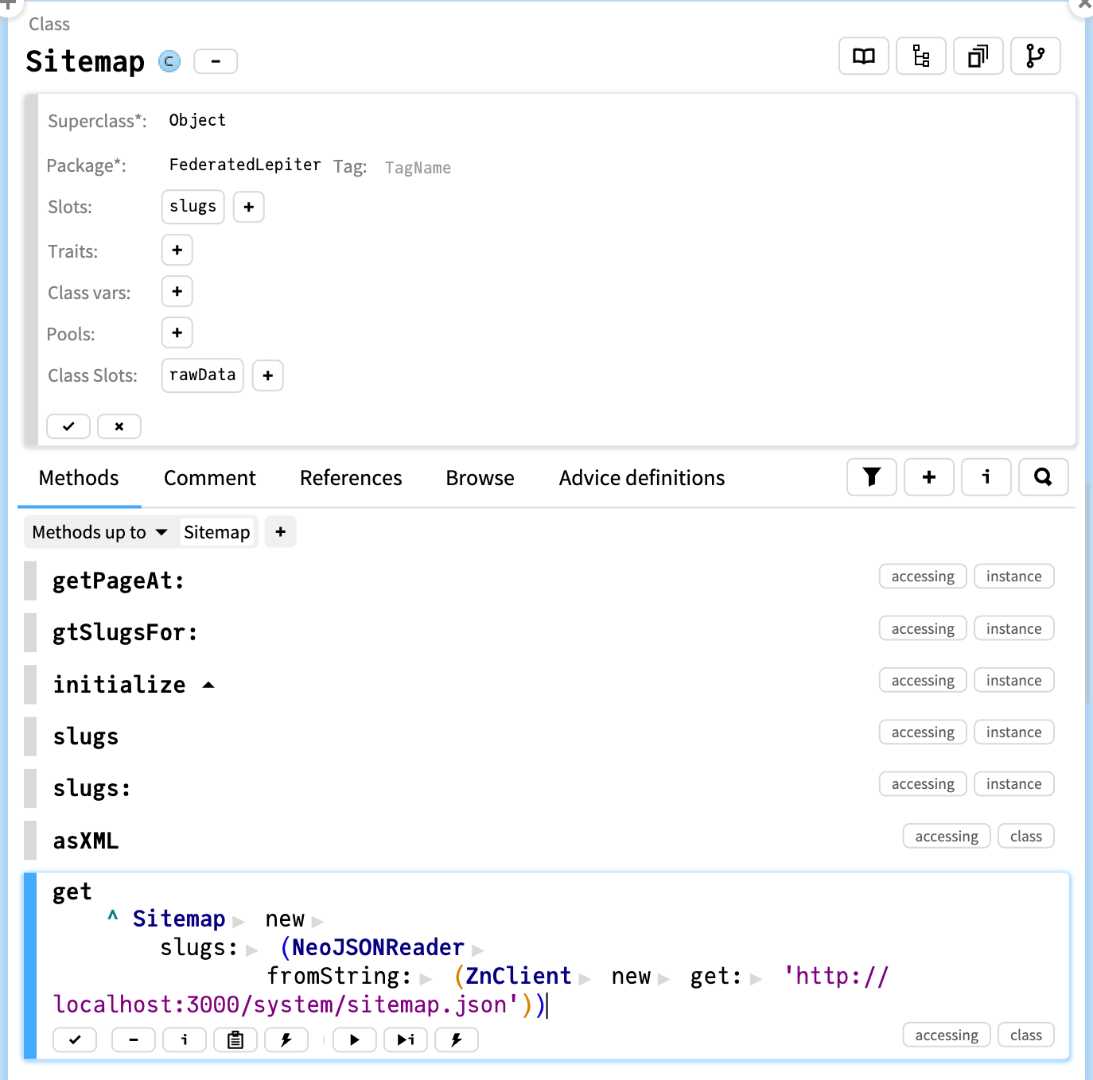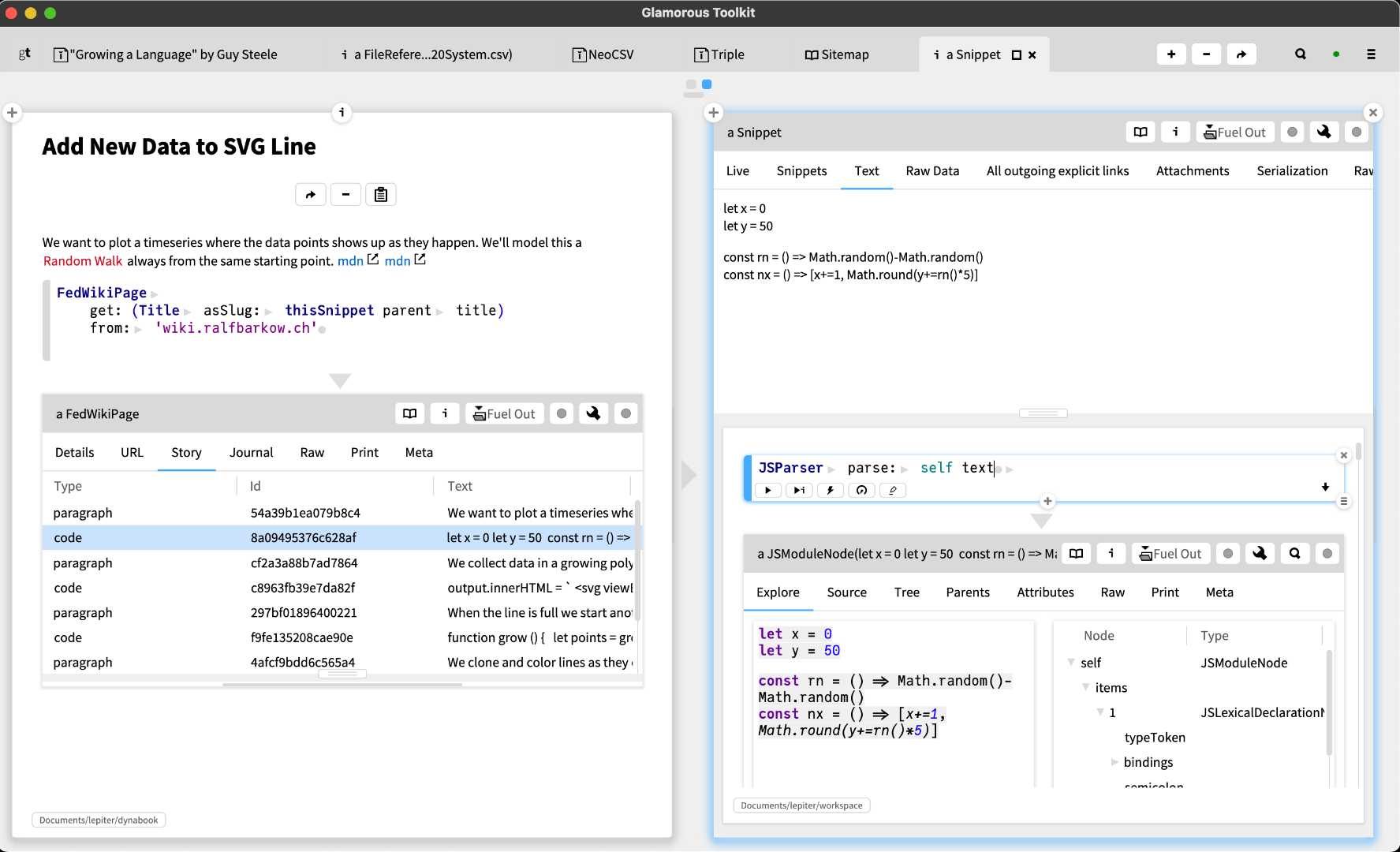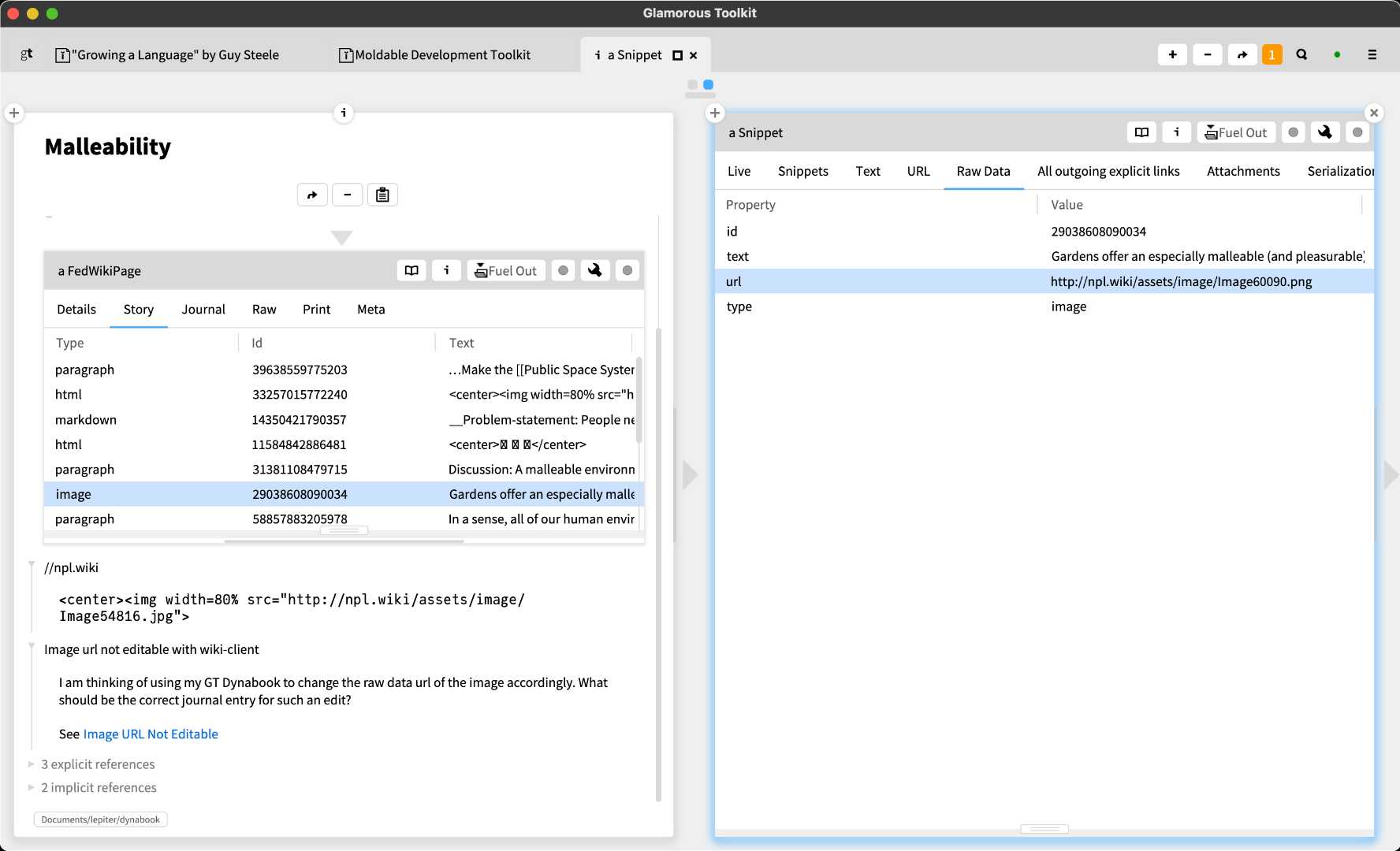⇐ Sitemap
Sitemap ask: aSite
~
Probabilistic Search by Random Walks
Snippet>>#gtCodeFor:
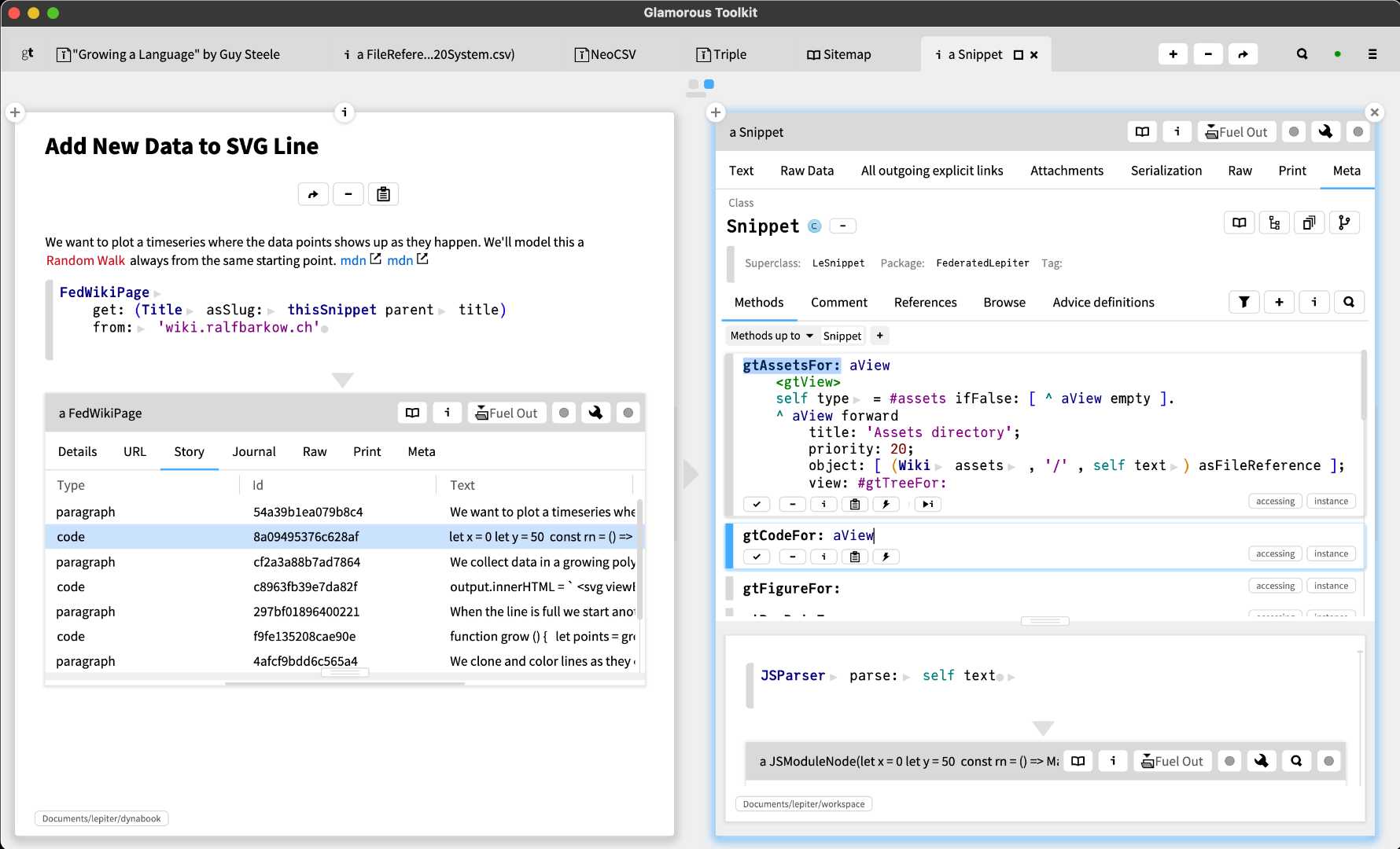
Snippet>>#gtCodeFor:
gtCodeFor: aView <gtView> self type = #code ifFalse: [ ^ aView empty ]. ^ aView forward title: 'Code'; priority: 20; object: [ JSParser parse: self text ]; view: #gtTreeFor:
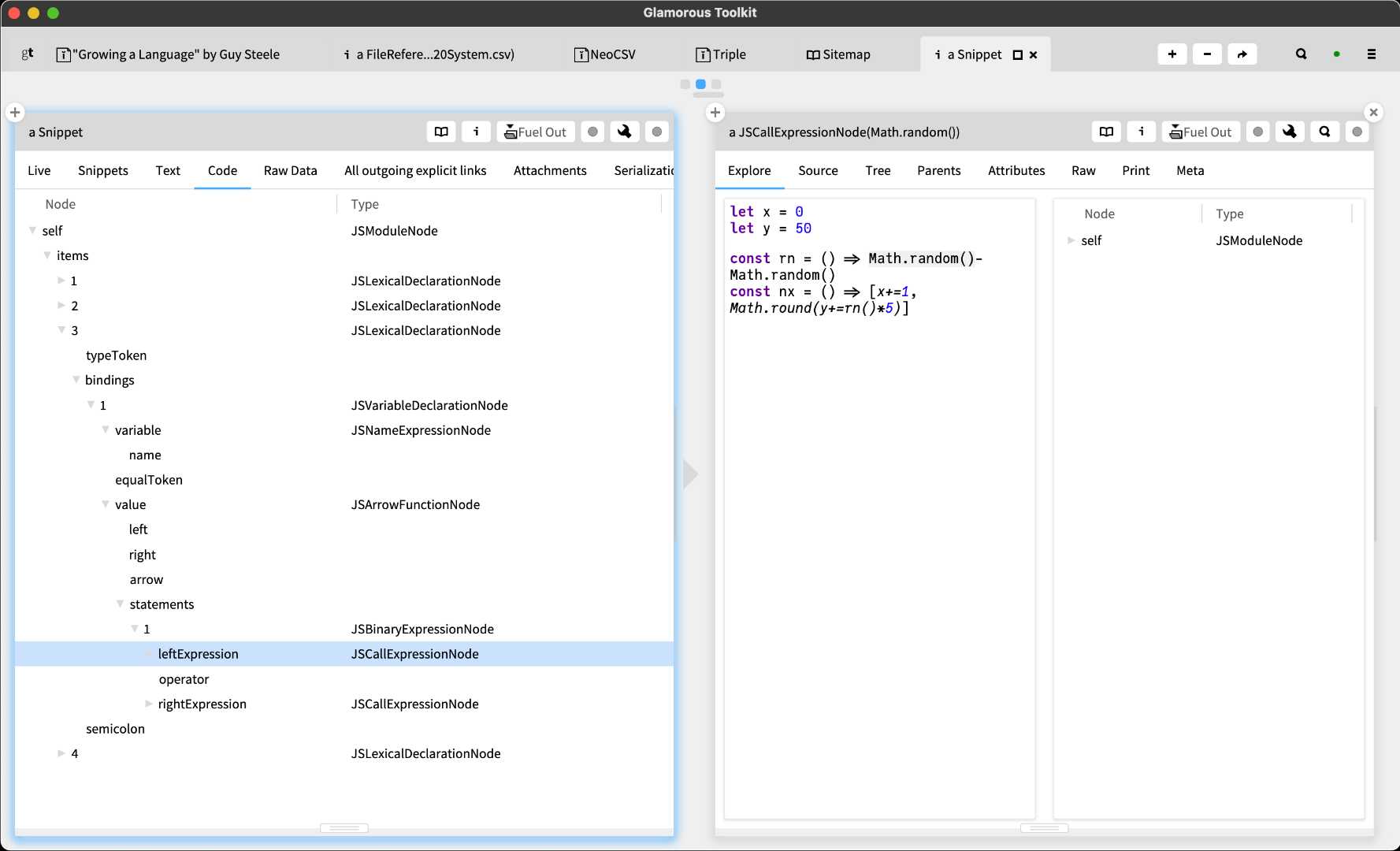
New Code view
~
automated translation of JavaScript to WebAssembly for SqueakJS post ![]()
See: A New Pattern Language for Growing Regions
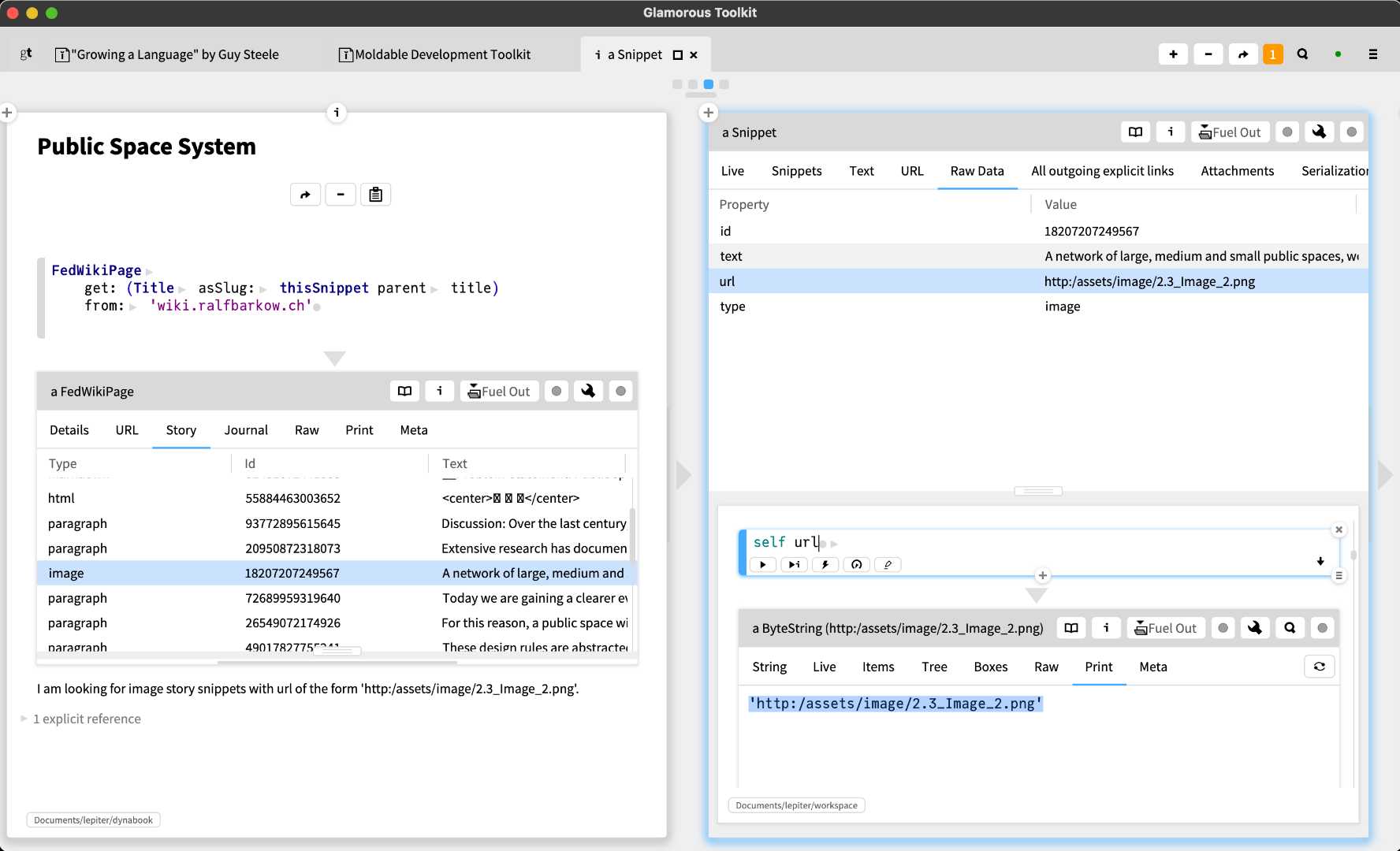
'http:/assets/image/2.3_Image_2.png'
I am looking for image story snippets with url of the form 'http:/assets/image/2.3_Image_2.png'.
The correct URL should look like this:
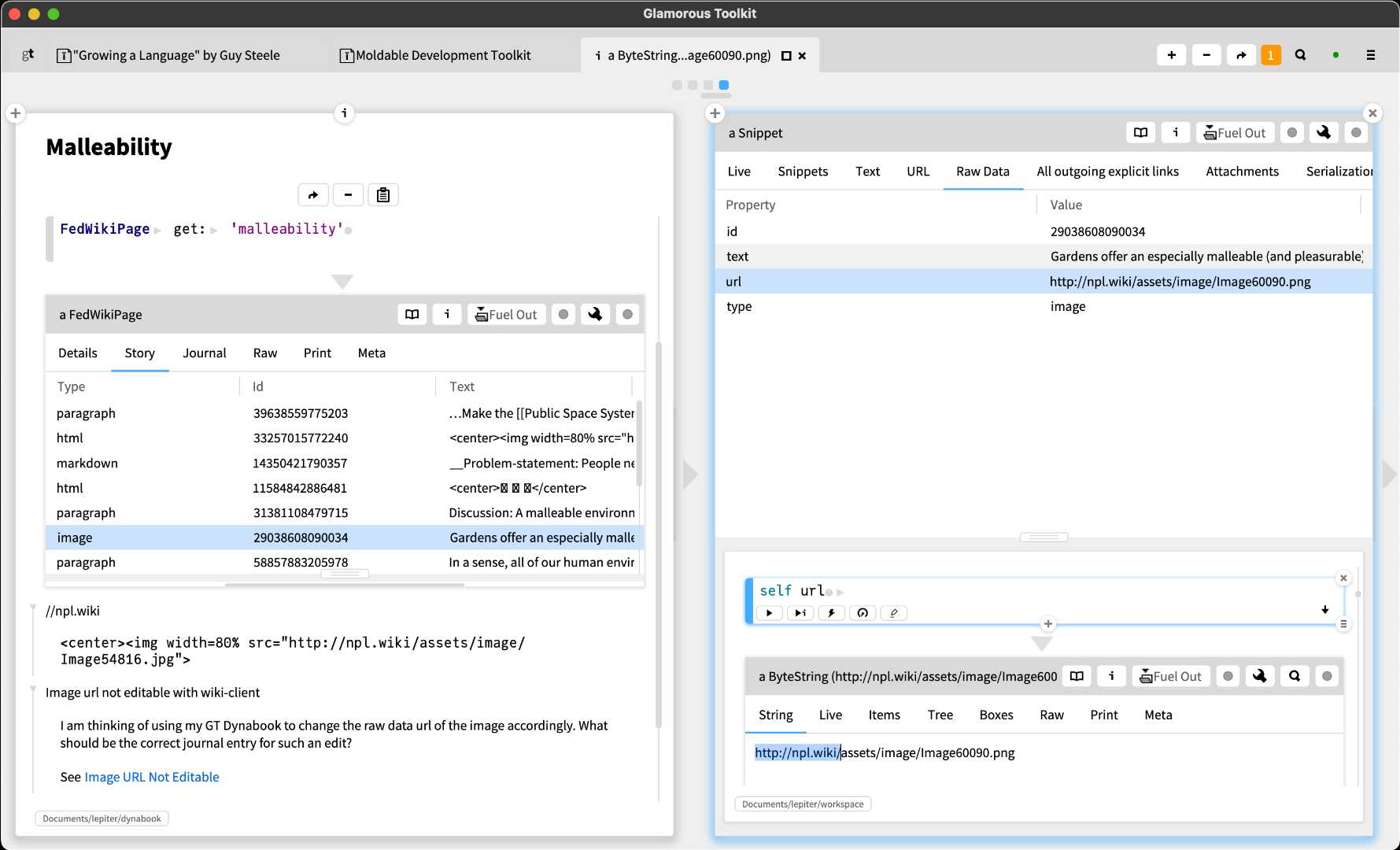
'http://npl.wiki/assets/image/Image60090.png'
'http://npl.wiki/assets/image/Image60090.png'
Growing Regions
STOP 66 END 66 YOUTUBE EzS60DaltAU A more concise version of the recording made with Ward Cunningham and Michael Mehaffy on February 11, 2019, about creating a new "federated" wiki structure to host a new pattern repository for environmental design patterns. Published on Feb 13, 2019.
Transcript:
We've been discussing logistically how we're going to create a federated wiki of patterns based on this work which has Michael's name on it here and is also a product assist a suspicion yeah well I'm a hanger-on and thus a stasis foundation and I'll let you describe me because I described to you
okay well Ward is of course the father of pattern languages of programming along with Kent Beck and wiki is absolutely the father of wiki and also a great get a contributor to agile and other movements and software a legend in the field but all started with pattern language isn't really right
that's right and so we're now trying and I would say it still has a long way to go right and we're pushing as hard as we can we hope you join us exactly
START 66 END 159 YOUTUBE EzS60DaltAU Topic 1: What is the Structure of the repository and its patterns?
So there's 56 patterns?
yep in the book right now
Do you think we could come up with a very concise version of that that doesn't really duplicate the book in any way but you could read it and feel like you've been through the book?
well I think that's actually something that we ought to have anyway right? And we ought to be able to read we ought to be able to see it the next version of the pattern
It should be an Invitation to improve. See Invitation to Improve
START 159 YOUTUBE EzS60DaltAU Topic 2: How does Sustasis host a "federated" process?
Sustasis Foundation would be responsible for this and […]
you sustained beep on scible for this and for relating to these and whatever you know sort of subsidiary governance like okay you guys are on your own but if you you know suddenly start writing that well we don't think our patterns anymore we're going to yank your credentials or something I don't know what but but there is a closed subsidiary relationship where we are exchanging materials and you can exchange materials with other peers and so on and so forth then if you're outside of that realm you're sort of off on your own at that point and you're you know you're making more or less a parallel project which is fine but it it doesn't bring us into the picture in terms of any administrative responsibilities or Hosting responsibility or anything like that does that make sense do you think?
yeah it depends upon how you want to organize
well I don't think under two levels one is it just the practical level of you know we can't administer every single potential you know
yeah you want to do sir you want this to be bigger right than any one person or any small group can do right right right
but as it gets bigger and bigger it will become its own thing right not your thing right
and that's okay but it needs to be clear I think when it's growing within the family so to speak and when it's going off and becoming its own thing which is also fine I mean obviously that and this is this goes to the whole sort of open source nature of the pattern language as they made very clear in the introduction that you know we want thousands of pattern languages and thousands of people writing every person innocent writing their own our language and so on and so forth and so we need to say that's great if you think we're all just off on the wrong track and you want to just go off and do your own thing and use the same software it's open source software so by all means go do that but if you're going to say well we want to play in your sandbox then okay there's a certain other level of of standards and expectations that are going to apply there so that makes sense you think you've got patterns down so this comes down here mm-hmm
and then they add to that a bunch of stuff that isn't a pattern they add photographs you know building plans maybe that actually has some review documents on the plans you know they're telling a whole story and so this is all discussion mm-hmm so so there's your pattern link to discussion mm-hmm then you say you know you've got a lot of discussion there that's kind of about how you work but you understand the pattern and I want it so you take this back and put it there and because it's come down here been expanded into maybe it doesn't pay trust not just one page then when this pattern whether they're four and it comes back it can be a one for one replacement for this right and it automatically connects to all this right and I mean the beauty of that is that of course in a hyperlinked format this can be it doesn't have to be poor parents yeah yeah it can be anything you want to keep in the session it could be a documentation of what got finally built in the end how it was built you know what problems they it can be very peripheral to what the pattern is all about but because it's just a hyperlink basically at this level then that means that go for it yeah and then yeah and then indirectly you've now connected this work to this work right because somebody can see that that this has been around in three different sites but you're not taking ownership of all this extra material the other thing is that again and I've been thinking a lot about this and they context where let's say this is a different climate and this is yet another different climate or different you know legal system or political system so they in effect their local adaptations that are required to meet the pattern and so this guy does you know one two three things to fit the pattern to the context and then this guy says oh I'm gonna do something like that not the same thing because I can't because my system is different my context is different but I'm gonna do something slightly different so in effect this connection this subsidiarity allows this pattern allows the powders to differentiate well that may be this one even came over here and this came from there and got pulled back so all of a sudden there's this collaboration that's going on that that is beneath you or beside you or something like that is just you know the the sprawling growth right that's a very good question whether or not everything goes back you know through a pull request or stays at this level and becomes peer-to-peer which is I haven't thought about that and I think that's something that we need to think about I suppose they're already looking at each other aren't they because if there's again if they're a curious part of the same federated network that I can see each other and they you can say hey I have this problem in my context how did you solve it in your context ah okay let me try something similar but not the same the other issue of this goes to the whole bigger question of curation and how the process works to generate better quality over time and you were talking about the comments section and people can just throw out any old comment especially when they're you know anonymous you know Twitter and so on but to be able to say no actually I'm engaged in a process it's got a structure I've got a role I know what we're all working towards together but then it seems like it's more like Wikipedia right it's more like we're building something and I want to add something I don't want to take stuff away or if I do take something away it's only in order to add more so Wikipedia had kind of a modest beginning mm-hmm in that Jimmy Wales liked the idea and he wrote a bunch of articles about Andriana mm-hmm because he was a little libertarian it right right so that was the foundation it wasn't much right there's more here in this book than they had that I'm sure you know the thing going back to Jimmy Wales in the founding of Wikipedia and I know that there was a lot of sort of libertarian utopianism I'll say yeah behind that but what I find that's interesting about is they found their way to something that is more like subsidiarity which is not really libertarianism libertarianism is this idea that you could just go off on your own and do whatever but what they ended up creating was curation right there's a structure and there's rules of the game and there's checks and balances and they're people with distributed roles everybody has a certain amount of autonomy but autonomy within a shared structure rather than you know you're off on your own to be a genius or whatever and all that was actually emergent yeah right on and it was not Jimmy yeah leading the charge on that right it was other people who fell in love with the project and who got good at the project yeah sharing that expertise with others and then pretty soon you know the hierarchy of editor rights yeah right emerged right back here action process yeah yeah so it was there were some charter elements like one was be bold mm-hmm you know if you think something's a good idea just be bolding do it mm-hmm and forgive whoever reverts you if he referred me to I guess is implicit in that you know in other words another one was if there's a rule that doesn't necessarily mean you have to follow it mm-hmm if there's a good reason to break the rule but you might have to defend it mm-hmm and the addition of talk pages you know really helped that because people could be challenged and and then they could defend themselves on these talk pages and then we get hammered out so it was a very good thing so there's this thing of neutral point of view right yeah they talked about that so I mean I I I think in our case we don't need that in in the sense that there is a in the patterns there's a normative judgment being made we think that this is going to be a better place for human beings that doesn't mean you can just claim that you'd actually have to provide the evidence but the evidence is still you know ultimately going to be interpreted subjectively I think or qualitatively I should say actually the word the better work would be inter subjectively because it's qualities that we can all share that most of us share when we're looking at a beautiful building or you know a beautiful pattern you know we say well this is better for people to be around a beautiful structure and so that's why I'm making this pattern to show you how to make a beautiful structure and so that there's all kinds of assumptions in there but they're not bad assumptions they're just they just need to be transparent you know you just need to understand well there there is this confusion a Wikipedia is explains that it is not a source of truth mm-hmm right and it makes no attempt to validate the truth of it it says it is a place that is is a condensation of material from truthful sources so they judge the sources that they quote right and insist that everything they say be defended by citation right well that means that they can never really get out the literature right it might be that we need to get out ahead of the literature right we need to be solving problems that maybe have solutions that haven't been described or maybe even the solution is not palatable yeah you know given our added to the current environment yeah and the current environment you know maybe it's really anti you cannot if you're something you know as if economist where the well that's how the other dimensions of this that I find exciting is the idea that there's something shareable to work on here you identify what's shareable and you get to work on it as opposed to you identify what you disagree with and then you fight over it and you get nowhere and that's not so in a sense there needs to be a certain amount of policy like that that is is thought-out at least in general terms yeah and it doesn't have to apply everywhere but it should apply to anything right that you know goes out under the name sustains what I realized in looking at this is this is actually a very good model of what they call subsidiarity where you've got you know local people working on local problems they're differentiated they're free in the sense that they're free to solve their own problem but they're not free in the sense that they're an island in nowhere they're part of a culture they're part of a larger system that has a set of expectations it's an ideally it works the way science works you know that you have various governing bodies and so on but they're not authorities in the sense that they tell everybody what to do they just are our peer reviewers they review what people are doing and they say actually you haven't cited that properly or you haven't your research in the right methods you know you haven't demonstrated that to be true but that's that's a lot like what we're talking about I think in a sense you
